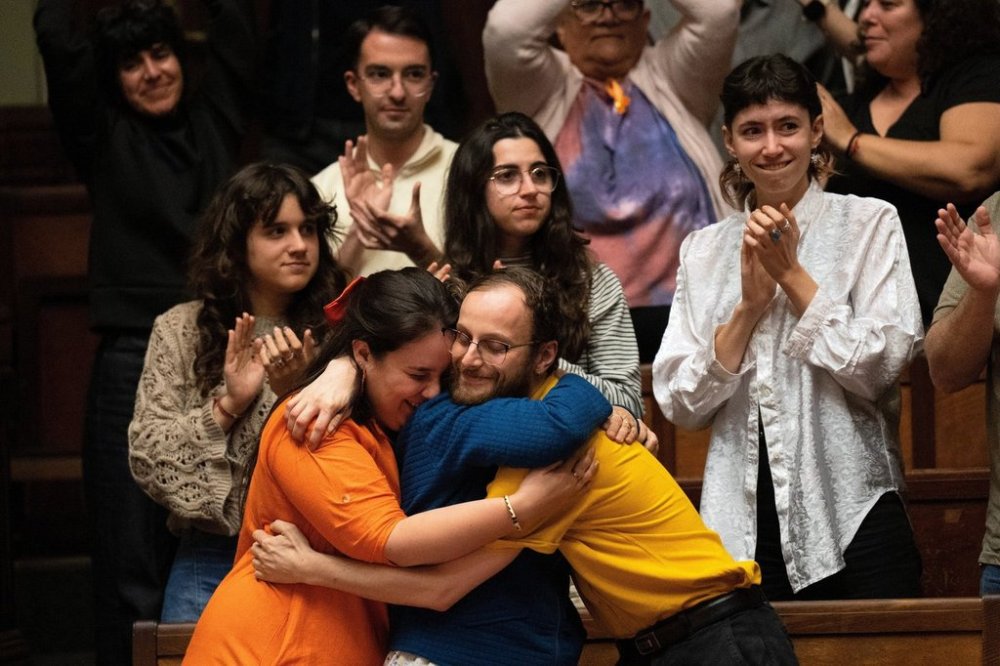In a regional first, Uruguay passes a law allowing euthanasia
Advertisement
Read this article for free:
or
Already have an account? Log in here »
To continue reading, please subscribe:
Monthly Digital Subscription
$0 for the first 4 weeks*
- Enjoy unlimited reading on winnipegfreepress.com
- Read the E-Edition, our digital replica newspaper
- Access News Break, our award-winning app
- Play interactive puzzles
*No charge for 4 weeks then price increases to the regular rate of $19.00 plus GST every four weeks. Offer available to new and qualified returning subscribers only. Cancel any time.
Monthly Digital Subscription
$4.75/week*
- Enjoy unlimited reading on winnipegfreepress.com
- Read the E-Edition, our digital replica newspaper
- Access News Break, our award-winning app
- Play interactive puzzles
*Billed as $19 plus GST every four weeks. Cancel any time.
To continue reading, please subscribe:
Add Free Press access to your Brandon Sun subscription for only an additional
$1 for the first 4 weeks*
*Your next subscription payment will increase by $1.00 and you will be charged $16.99 plus GST for four weeks. After four weeks, your payment will increase to $23.99 plus GST every four weeks.
Read unlimited articles for free today:
or
Already have an account? Log in here »
MONTEVIDEO, Uruguay (AP) — Uruguay’s senate passed a law decriminalizing euthanasia on Wednesday, putting the South American nation among a handful of other countries where seriously ill patients can legally obtain help to end their lives.
It makes Uruguay the first country in predominantly Catholic Latin America to allow euthanasia via legislation. Colombia and Ecuador have decriminalized the practice through Supreme Court decisions.
In Chile, left-wing President Gabriel Boric recently revived a push for the approval of an euthanasia bill long stalled in the Senate.

Fierce debates and spirited activism around the practice has gripped the region in recent years.
“Public opinion is asking us to take this on,” Sen. Patricia Kramer of Uruguay’s governing leftist coalition told lawmakers in the country’s capital of Montevideo.
The law, which moved forward in fits and starts over the last five years, cleared its final hurdle on Wednesday as 20 out of 31 senators voted in favor. The lower house approved the bill in August with a large majority. All that’s left is for the government to implement the regulations.
During the debate, senators from the ruling Broad Front coalition delivered impassioned defenses of the right to die, comparing the euthanasia movement to the legalization of divorce and same-sex marriage.
“We all believe and feel that life is a right, both in health and in sickness, but it should never be an obligation because others don’t understand such unbearable suffering,” Sen. Daniel Borbonet said after quoting testimony from Uruguayan patients with irreversible medical conditions.
Most opposition to euthanasia in Uruguay came from the Catholic Church. Before the vote, Daniel Sturla, the archbishop of Montevideo, called on Uruguayans “to defend the gift of life and to remember that every person deserves to be cared for, accompanied and supported until the end.”
But secularization has eroded resistance to the practice in this country of 3.5 million people, which bans any mention of God in oaths of office and calls Christmas “Family Day.”
Officials hailed the law’s passage as reinforcing Uruguay’s reputation as among the most socially liberal nations in the region. The country was first in the world to legalize marijuana for recreational use and passed pioneering legislation allowing same-sex marriage and abortion over a decade ago.
“This is a historic event, which places Uruguay at the forefront in addressing deeply human and sensitive issues,” said Vice President Carolina Cosse.

The legislation permits euthanasia, performed by a healthcare professional, but not assisted suicide, which involves a patient self-administering a lethal dose of prescribed medication.
Unlike laws in U.S. states, Australia and New Zealand restricting euthanasia to those with a life expectancy of no more than six months or a year, Uruguay sets no time limits. It also not does require a waiting period, and allows anyone suffering from an incurable illness that causes “unbearable suffering” to seek assisted death, even if their diagnosis is not terminal.
Uruguay requires that those seeking euthanasia to be mentally competent.
Although the law does not outright ban euthanasia for those with mental conditions like depression, it requires that patients get two doctors to rule that they are psychologically fit enough to make the decision.
Unlike Belgium, Colombia and the Netherlands, Uruguay will not allow euthanasia for minors.

